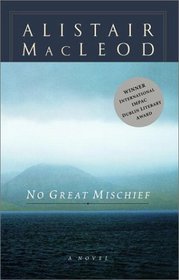Helpful Score: 1
In 1779 Calum MacDonald set said in exile from the Highlands of Scotland with his wife and twelve children, along with the dog that would not be left behind and swam after the departing boat. After a catastrophic crossing he landed in the New World at Cape Breton, by which time he had become a widower and a grandfather.
Two hundred years later, another MacDonald tells his story of coming of age in that same bleakly beautiful Cape Breton landscpe. Alexander is orphaned by a cruel accident on the ice, and his yearning for connection with family produces two luminous narrative strands: a summer spent in the mines with his wild older brothers that ends in murder and, much later, his tender care for one of those brothers, now ailing. As a child, Alexander learned from his grandmother to, "always look after your blood." But blood and history are all but inescapable for the MacDonalds. The brothers still speak Gailic to each other; legends lurk at the edge of the simplest conversation; language and music are themselves links to a heroic past.
By turns epic and intimate, this is astonishing storytelling, informed by tradition and perfected by an exceptional craftsman.
Two hundred years later, another MacDonald tells his story of coming of age in that same bleakly beautiful Cape Breton landscpe. Alexander is orphaned by a cruel accident on the ice, and his yearning for connection with family produces two luminous narrative strands: a summer spent in the mines with his wild older brothers that ends in murder and, much later, his tender care for one of those brothers, now ailing. As a child, Alexander learned from his grandmother to, "always look after your blood." But blood and history are all but inescapable for the MacDonalds. The brothers still speak Gailic to each other; legends lurk at the edge of the simplest conversation; language and music are themselves links to a heroic past.
By turns epic and intimate, this is astonishing storytelling, informed by tradition and perfected by an exceptional craftsman.
Helpful Score: 1
The art of story telling is alive and well. History and family are important themes. The book beautifully depicts how the past is always with us.
Helpful Score: 1
This book is in perfect condition except for one thing...on the inside firsst paper page is written, "Kate Little, August 2002" <---measures about 2" by 3/4" in a light purple marker. Otherwise, It's pristine. Story takes place in 1779 when a family sets sale from the Highlands of Scotland to Cape Breton...covers that time to 200 years later. A heart-wrenching story and very brilliant descriptions of the people and the place and times. I really, really liked this book. Hope someone else will too.
wonderful story of a family over generations - from Scotland to Canada.
I thought the story would be interesting, but a little over half way through, I had to give up. I found myself skipping paragraphs more and more. It just didn't hold my attention . Hope whoever else reads this will do better.
Excellent book about family loyalty. Knowing your heritage. It follows a young boy to his adulthood. his recollections of his people who were loggers,miners,drinkers, adventurers but always a family or clan.
This book snuck up on me. It started so slowly, with a successful orthodontist driving to visit his alcoholic older brother. While this "current" (actually 1970s) storyline continues throughout the book, the majority of the novel consists of flashbacks which reveal the past and what brought the brothers to such different places in life.
These two brothers come from a huge Scottish-Canadian clan, descended from the twelve children of Alexander MacDonald who settled on Cape Breton Island in Nova Scotia. The narrator is also named Alexander MacDonald, as are several other characters. Don't worry, it's not as confusing as it sounds. There are stories from the Highlands (which made me wish I knew more about Scottish history), from the narrator's childhood and young adulthood, as well as more recent interactions between him and his twin sister, who also left the poverty of island life behind.
MacLeod's writing has a distinctly Gaelic sensibility that I love: dark but warm, unapologetic, and a little bawdy. His tendency to ramble is mostly charming, but sometimes his tangents wandered a bit too far off course. Disappointingly, this is the only novel he has written. He apparently excels in the short story format, which isn't my favorite, but may be worthy of an exception in this case.
These two brothers come from a huge Scottish-Canadian clan, descended from the twelve children of Alexander MacDonald who settled on Cape Breton Island in Nova Scotia. The narrator is also named Alexander MacDonald, as are several other characters. Don't worry, it's not as confusing as it sounds. There are stories from the Highlands (which made me wish I knew more about Scottish history), from the narrator's childhood and young adulthood, as well as more recent interactions between him and his twin sister, who also left the poverty of island life behind.
MacLeod's writing has a distinctly Gaelic sensibility that I love: dark but warm, unapologetic, and a little bawdy. His tendency to ramble is mostly charming, but sometimes his tangents wandered a bit too far off course. Disappointingly, this is the only novel he has written. He apparently excels in the short story format, which isn't my favorite, but may be worthy of an exception in this case.
This is an interesting story about a Scottish family who immigrates from Scotland to Newfoundland. Mostly it involves the parents, the grandparents and the sons of the parents.It presents an in depth insight into a way of life that to me is very different.




